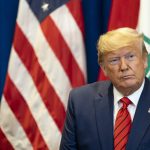In a flurry of executive orders, President Trump has put forth a series of significant actions that could reshape U.S. immigration policy, national security, and the interpretation of citizenship. The president’s move to designate drug cartels as foreign terrorist organizations stands out as a bold attempt to tackle the epidemic of drug-related violence at the southern border. By recognizing these cartels as terrorists, the administration sends a clear message that it is ready to take a militarized approach to protect American citizens, potentially using elite forces like SEAL Team Six at some point in the future. While this might sound like the plot of an action movie, it’s a serious endeavor aimed at restoring safety and order at a border currently overshadowed by cartel control.
Joining the border security measures is the reinstatement of the “Remain in Mexico” policy. This policy mandates that asylum seekers must wait in Mexico while their claims are processed instead of slipping into the U.S. and vanishing into the crowd. This shift may help reduce the burden on American immigration courts, which are often overwhelmed with backlogged cases. By reinforcing such protocols, the administration underscores its commitment to an orderly immigration system that prioritizes legal processes over chaotic crossings.
A more controversial executive order revolves around the termination of birthright citizenship for children born to illegal immigrants in the U.S. This decision raises eyebrows, suggesting that a reexamination of the 14th Amendment is in order. The Constitution asserts that citizenship is granted to “all persons born or naturalized in the United States and subject to the jurisdiction thereof.” This nuanced legal language suggests that merely being born on U.S. soil does not automatically confer citizenship if at least one parent is not subject to U.S. jurisdiction, sparking a fiery debate over interpretation. While this does not retroactively strip anyone of their citizenship, it could change the game for future generations.
Beyond immigration, Trump’s directives also aim at ousting the influence of diversity, equity, and inclusion (DEI) initiatives from federal agencies. The argument against DEI posits that it fosters a form of discrimination rather than equality, thus undermining the meritocracy principle. By eliminating these programs, the administration hopes to ensure that government resources are dedicated to performance rather than the politics of identity. In addition, defunding certain international organizations, particularly those perceived as mismanaging global health crises like COVID-19, illustrates a commitment to prioritizing American interests over foreign entanglements.
In a dash of humor, the president took a detour with an executive order to rename Mount Denali back to its original name, Mount McKinley. This cheeky maneuver aims to rekindle a sense of national pride, though it quickly drew criticism. Nonetheless, it fits neatly into a series of decisions that showcase Trump’s willingness to challenge the status quo. Alongside debates about major infrastructure projects and a review of foreign aid, these executive orders reflect the administration’s zeal for reshaping policy according to its vision of American exceptionalism.
In sum, these newly signed executive orders signal a turning point in U.S. governance, pushing for stricter immigration policies and a reassessment of existing laws and practices. As each order unfolds, it will undoubtedly spark discussions and debates across the nation. Whether you agree with his moves or not, Trump’s commitment to redefining American policy is clear, raising vital questions about the future direction of the country. Buckle up because, with such audacious changes on the horizon, the next few years promise to be nothing short of a rollercoaster ride—one that could ultimately lead to a different landscape for immigration, citizenship, and national identity.




